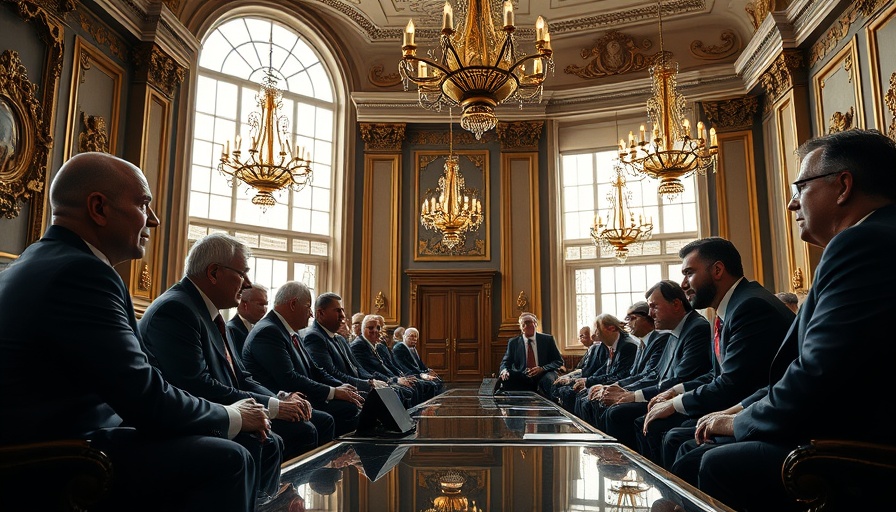
The Urgency of Peace: What Rubio's Remarks Mean for Ukraine
In a striking declaration amidst high-level discussions in Paris, Secretary of State Marco Rubio made it clear that the United States may soon abandon its efforts to broker peace in Ukraine if significant progress is not achieved in the following days. His remarks raise critical questions about the future of U.S. involvement in the ongoing conflict and signal possible shifts in the dynamics of international diplomacy regarding this war.
A Shift in Political Messaging
During his press briefing, Rubio emphasized the timeline that the Trump administration is imposing on Ukraine, stating, "If it is not possible to end the war in Ukraine, we need to move on." This ultimatum introduces uncharacteristic urgency into American diplomacy, particularly since the U.S. has historically been a staunch supporter of Ukraine since the beginning of the conflict. It appears that Rubio's comments are not only directed at Ukraine but also at European allies, pushing for shared responsibility in seeking a resolution.
Implications for Ukraine and the Global Community
The statement has undoubtedly caused concern within Ukraine, which relies heavily on U.S. military support and aid. As President Volodymyr Zelensky faces the pressing need to negotiate a ceasefire, Rubio's remarks add pressure to consider concessions that could stabilize the situation. However, there is a complex web of emotions surrounding these negotiations, as many Ukrainians feel that compromising may betray those who lost their lives in the ongoing conflict.
Trump's Perspective: An Uncommon Approach
Rubio’s comments were further underscored by remarks made earlier by former President Donald Trump, who expressed frustration over the lack of response from certain countries to U.S. diplomatic initiatives. Trump portrayed a sense of impatience, suggesting that the ongoing conflict has cost thousands of lives without sufficient pressure on Russia to change its course. His tone and approach, however, could also alienate potential allies who favor a more diplomatic route than the hardline ultimatums being issued.
Counterarguments: The Case for Continued Support
Despite the mounting pressure for Ukraine to concede, many advocates argue that halting support now would not only undermine Ukrainian sovereignty but could also encourage further aggression from Russia. Experts in international relations warn that abandoning Ukraine might set a dangerous precedent where aggressors see that their tactics yield desired results without repercussions. Furthermore, this shift in U.S. policy might embolden other nations tempted by expansionist ambitions.
The Bigger Picture: Future Predictions and Opportunities
As we consider potential outcomes, one key possibility is a re-evaluated approach to international alliances. If the U.S. decides to back away from Ukraine, we could witness shifts in alliances and new diplomatic relationships forming among nations that share trade interests or political ideologies counter to current U.S. policy. The groundwork for a more collaborative, multipolar world may begin to emerge, with consequences that could redefine global power structures.
Practical Insights for Readers
For concerned citizens following the developments surrounding the Ukraine conflict, understanding these dynamics is crucial. Advocacy for Ukraine remains critical, as public pressure can shape the policy decisions of lawmakers. Engaging in discourse around foreign policy, attending town hall meetings, and communicating with representatives are practical avenues to make an impact. The ongoing narrative surrounding this war reminds us that peace processes are often fraught with difficult choices, and every voice contributes to the larger story.
Moving Forward: What Should America Do?
As negotiations continue and timelines loom, it’s essential for U.S. officials to consider the long-term implications of their decisions. Maintaining a commitment to Ukraine should remain a priority, as the principles of self-determination and territorial integrity are at stake. Moreover, the opportunity exists for America to lead in creating a principle-based international order, where diplomacy prevails over aggression.
While the path forward remains uncertain, the urgency for resolution is clear. For the sake of Ukraine and the international community’s stability, finding a sustainable and equitable solution is a goal worth pursuing.
 Add Row
Add Row  Add
Add 




 Add Row
Add Row  Add
Add 

Write A Comment